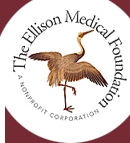 | Bruce N. Ames, Ph.D.
Children's Hospital, Oakland Research Institute | | Reversal of Mitochondrial Decay: From Rats to Humans
1999 Senior Scholar Award in Aging

Research Interests.
Our major interest is the decay of mitochondria with age due to the oxidative damage of mtDNA, proteins, and lipids. We are making progress in reversing some of this mitochondrial decay in old rats by the feeding of normal mitochondrial metabolites at high levels; we now wish to extend this work to humans. Our second... (more) |
|
 | Steven N. Austad, Ph.D.
University of Idaho | | Genetic Mechanisms of Exceptional Oxidative Damage Resistance in Birds
1999 Senior Scholar Award in Aging

Evidence that oxidative damage, a by-product of normal metabolism in virtually all animals, is causally involved in the process of aging and the development of degenerative disease has been steadily accumulating for more than forty years. An understanding of the exact nature of this damage to specific cell components and... (more)(Following this award, Dr. Austad relocated to the University of Texas Health Science Center – San Antonio. Contact Dr. Austad) |
|
 | James E. Cleaver, Ph.D.
University of California - San Francisco, UCSF Cancer Center | | Endogenous DNA Damage and Mechanisms of Aging
1999 Senior Scholar Award in Aging

Endogenous DNA damage and spontaneous mutagenesis may be important mechanisms in aging. We are developing mouse strains defective in base excision repair (BER) that cannot repair endogenous DNA damage through knockout of the Xrccl scaffold protein. The Xrccl protein interacts with ligase III to coordinate BER and is essential for viability... (more) |
|
 | Gretchen J. Darlington, Ph.D.
Baylor College of Medicine | | Identification of Candidate Genes for Longevity in Long Lived Mouse Models
1999 Senior Scholar Award in Aging

Few mammalian models of aging have the phenotype of increased life span. Virtually all work has focused on food restricted (FR) rodents. Although many changes in physiologic function and gene expression have been identified, it is difficult to determine which changes contribute significantly to life span extension. ... (more) |
|
 | Michael E. Greenberg, Ph.D.
Children's Hospital, Boston | | The Role of P13K/Akt Dependent Phosphorylation of a Mammalian Fork Head Transcription Factor FKHRL1 in Cell Senescence and Organismal Aging
1999 Senior Scholar Award in Aging

We propose to study the importance of a cellular signaling pathway, termed the P13K/Akt/Daf16 pathway, for determining the life span of cells and multi-cellular organisms. Disruption of the P13K/Akt pathway has previously been shown to affect the life span of... (more) |
|
 | Titia de Lange, M.D. , Ph.D.
Rockefeller University | | The Role of T-loops in Aging of Human Cells
1999 Senior Scholar Award in Aging

In collaboration with Jack Griffith (UNC) we have found that human telomeres form large duplex loops (t-loops). We propose that t-loops represent the mechanism by which telomere ends are masked from the cellular machinery that detects DNA breaks. Our working hypothesis is that telomere shortening in aging human cells results in chromosome ends that no... (more) |
|
 | Lawrence A. Loeb, M.D., Ph.D.
University of Washington | | Aging in Mutator and Antimutator Mice
1999 Senior Scholar Award in Aging

Accurate copying of DNA in cells is carried out by DNA polymerases. These enzymes polymerize nulceotides that are complementary to the nucleotides in the cellular DNA template, yielding daughter DNA molecules that preserve the nucleotide sequence of the parental molecules. Errors in this process, if not repaired, result in mutations. Mutations in DNA... (more) |
|
 | David S. Thaler, Ph.D.
Rockefeller University | | Mitochondrial Mutation and Aging
1999 Senior Scholar Award in Aging

Mitochondria have been proposed by others to be both initiators and targets of cellular degeneration associated with aging. The proposed work is designed to test specific hypotheses in which cellular degradation and aging are related to mitochondrial mutation. Measurement and implications of reversible intermediates in mitochondrial mutation.
more) |
|
 | Douglas C. Wallace, Ph.D.
University of California - Irvine | | Mitochondrial Aging in the Chimpanzee
1999 Senior Scholar Award in Aging

Evidence continues to accumulate that aging is associated with a decline in mitochondrial function, suggesting that mitochondrial dysfunction maybe a major factor in the pathophysiology of aging and senescence. The mitochondria provide most of the cellular energy through oxidative phosphorylation (OXPHOS), and generate most of the endogenous oxygen radicals... (more)(Research for the first 3 years was conducted at Emory University.) |
|
 | Sherman M. Weissman, M.D.
Yale University School of Medicine | | The Molecular/Physiological Basis for Accelerated Aging in the Werner's Syndrome
1999 Senior Scholar Award in Aging

The Werner syndrome is a human genetic disorder associated with premature onset of symptoms resembling extreme aging. The disease is caused by a mutation in a helicase, but the specific cellular processes that are impaired by the absence of the helicase and the relationship of this impairment to the problems... (more) |
|

